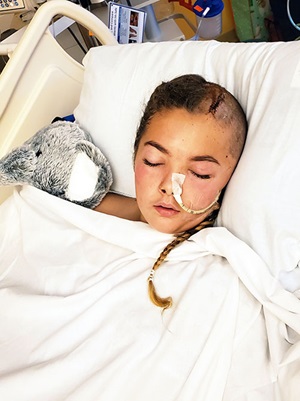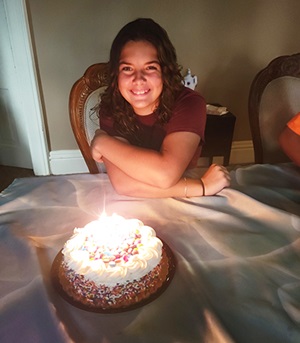It was a day like any other. 11-year-old me was asleep in my bed with my head against the pillow. I had been sick that week so there was no need to wake early for school. This day was just like the last until chaos occurred. My mother came to my room to check on me and there I was sitting, staring. Staring into space as if I was sleeping with my eyes wide open. My mother tried to grab my attention, snapped at me, grabbed me, but there I sat. Blank, no signs of life except for a single breath every few seconds, and an unending heartbeat.
READ MORE: When a young girl lost the ability to talk, doctors made a shocking discovery

My mother thought that I was having a stroke, but that wasn’t it. I don’t even really know what it was to this day. I was sitting in the Emergency Room, still blank. I was having an MRI (Magnetic Resonance Imaging) when they had told my mom that I had some sort of fluids in my brain. They rushed me to Children’s Wisconsin where I had surgery to take the fluids out, but it wasn’t that easy.
Over many days there had been many draining surgeries where they took fluid out of my skull. They had taken out the left half of my skull to do the surgeries and left it out. At this time I was not there. I don’t know where I was but I was not there. By the time I woke up I didn’t remember anything from after the day before my blankness. I don’t remember anything up until one day my mom and aunt were putting up a Christmas tree in my room. I was very curious as to why they were putting up the tree because in my mind very little time had passed and it was still October. At the time I could not yet talk or barely spell, plus the right side of my body was paralyzed. I had a sheet next to me that had the letters of the alphabet on it and I used it to make words. With the sheet, I had spelled h-a-l-l-o-w-e-e-n. I had not realized Halloween had passed and it had already been a month since I had been in the hospital.
Just the thought of my parents during this time defeats me. The worry and sorrow in my mom's eyes and the invisible streaks of tears falling from the sobs in her head. My dad’s silent pain which could only be seen by him. There was anger in his voice that sounded like thunder. They were scared for me. The whole time they felt sorry for me because I did nothing to deserve it, but if it had to be someone in the family, I'm glad it was me. I would not like to be the one sitting there not being able to do anything if someone from my family was suffering. All that I could think of at night was the beeping of my heartbeat on the monitor and the glow of machines behind my hospital bed. There were piles and piles of cards on my counter from supporters. Every night when I would try to adjust to make myself comfortable, the ear-piercing beeping would begin because my IV had been out of place. This would happen two to three times a night.
Soon, the doctors started me on hyperbaric treatment. Hyperbaric treatment was often referred to as a dive when they were explaining it to me and my parents. Hyperbaric treatment is where you sit in a big tube and they increase the air pressure. I don’t know anything else about it except that it does help. A few weeks, even days, after I started the hyperbaric treatments, I started healing tremendously. During physical therapy, I started walking with the help of a walker and someone next to me. By Thanksgiving, I was talking. I could say words like hi, and family members' names. I was wearing a helmet wherever I went so that my brain would not get punctured or something. But I still couldn’t walk by myself. I was upset about this because it was a pain to stay in bed. Even if the bed was moving, I wasn’t.
 One day after breakfast, I was getting out of bed to go to physical therapy, and I confidently told my physical therapist to let go. She hesitated, but then she did. She didn’t let go fully, she was still holding onto my belt so I didn’t fall, but I was walking. I was walking! I was so happy to be walking. I've been waiting and waiting to be able to walk. My mom was standing on the other side of the room with tears in her eyes. After about three weeks in the hospital, I was walking. Everything went so fast after that, I was talking in full sentences, using my right hand, everything.
One day after breakfast, I was getting out of bed to go to physical therapy, and I confidently told my physical therapist to let go. She hesitated, but then she did. She didn’t let go fully, she was still holding onto my belt so I didn’t fall, but I was walking. I was walking! I was so happy to be walking. I've been waiting and waiting to be able to walk. My mom was standing on the other side of the room with tears in her eyes. After about three weeks in the hospital, I was walking. Everything went so fast after that, I was talking in full sentences, using my right hand, everything.
I believe this was a true rite of passage because I was a stronger character. I had matured in the fact that I knew what it was like to go through something big. I had been through a true experience of good and bad. I was an older me, a me that would not take anything for granted because me being here today is a miracle if I ever saw one. I came home on Dec. 13, which means I had been in the hospital for 46 days. I was still wearing a helmet after I returned home. I started school again about two weeks after the fact, but I was only going for half the day. Then, finally that summer I had my last surgery and no longer needed a helmet, and I was pretty much back to normal. It was over. The long journey was finally over. And I was me, myself again at last.







